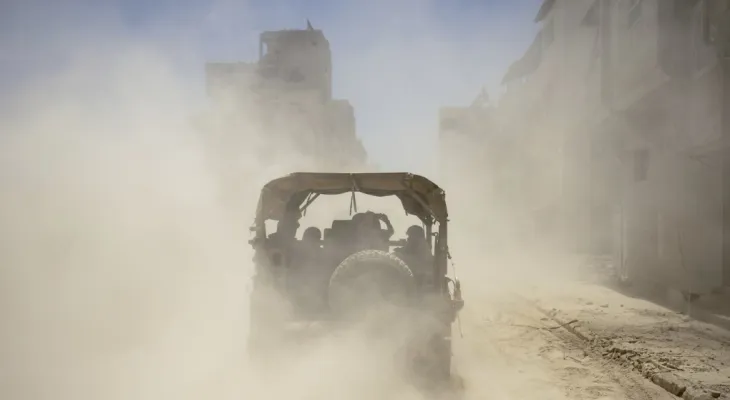Search here
Newspaper
Search here

Arab Canada News
News

Published: July 7, 2024
Two months ago, before Israeli forces invaded Rafah, the city was home to most of the over two million residents of Gaza. Today, it is a ghost town covered in dust.
Abandoned residential buildings, riddled with bullets, destroyed walls, and shattered windows. Bedrooms and kitchens can be seen from the roads strewn with piles of rubble rising above passing Israeli military vehicles. Only a very few civilians remain.
Israel claims it nearly defeated Hamas forces in Rafah – an area identified earlier this year as the last stronghold of the armed group in Gaza.
On Wednesday, the Israeli army invited journalists to Rafah, the first time international media has visited the southernmost city of Gaza since it was invaded on May 6. Israel has barred international journalists from entering Gaza independently since Hamas's attack on October 7, which sparked the war.
Before the invasion of Rafah, Israel said that the remaining four Hamas battalions had retreated there, an area of about 25 square miles (65 square kilometers) on the border with Egypt, where Israel claims hundreds of militants were killed in its assault on Rafah. Dozens of women and children have also died due to Israeli airstrikes and ground operations.
The army says it was necessary to operate with such intensity because Hamas turned civilian areas into deadly traps. Eight soldiers were killed last month in a single explosion.
Israel's chief military spokesperson, Admiral Daniel Hagari, said during a tour on Wednesday while standing above a passage leading underground: "Some of these tunnels are booby-trapped." “Hamas built everything in a civilian neighborhood, between houses, between mosques, among the population, to create its terrorist ecosystem.”
An estimated 1.4 million Palestinians are crammed into Rafah after fleeing fighting in other parts of Gaza. United Nations estimates indicate that about 50,000 people remain in Rafah, which had a population of about 275,000 people before the war.
Most have moved to a nearby "humanitarian zone" declared by Israel where conditions are dire. Many are crowded into miserable camps along the shore, receiving only scant supplies of clean water, food, bathrooms, and medical care.
Efforts to bring aid into southern Gaza have stalled. The Israeli incursion into Rafah has closed one of the main crossings to southern Gaza. The United Nations says that very little aid can enter from the other main crossing – Kerem Shalom – because the road is too dangerous and convoys are vulnerable to attacks from armed groups looking for smuggled cigarettes.
On Wednesday, there was a line of trucks on Gaza's side of the Kerem Shalom crossing, but the trucks were barely moving – a sign of how Israel's pledge to keep the route safe for facilitating aid delivery into Gaza has failed.
United Nations officials confirmed that some commercial trucks crossed the road leading to Rafah, but not without armed hired guards riding on their convoys.
Israel claims it is nearing the dismantling of the group as an organized military force in Rafah. Reflecting this confidence, soldiers brought journalists in open military vehicles on the road leading to the heart of the city.
Along the way, the debris on the roadside illustrated the dangers of delivering aid: the carcasses of trucks lying under the blazing sun; the dashboards covered with nets aimed at protecting drivers; aid platforms lying empty.
Humanitarian organizations emphasize that the longer the freeze on aid delivery lasts, the closer Gaza comes to running out of fuel, which is essential for hospitals, water treatment plants, and vehicles.
Dr. Hanan Balkhy, the WHO Regional Director for the Eastern Mediterranean, stated: "Hospitals are once again suffering from fuel shortages, threatening to disrupt vital services." "Injured people are dying because ambulance services are delayed due to fuel shortages."
As the humanitarian situation deteriorates, Israel continues its assault. Fighting in Rafah persists.
After hearing gunfire nearby on Wednesday, soldiers informed the group that they would not visit the beach as planned.
The group left the city shortly after, amid clouds of dust kicked up by vehicles, momentarily obscuring the destruction behind them.
Comments